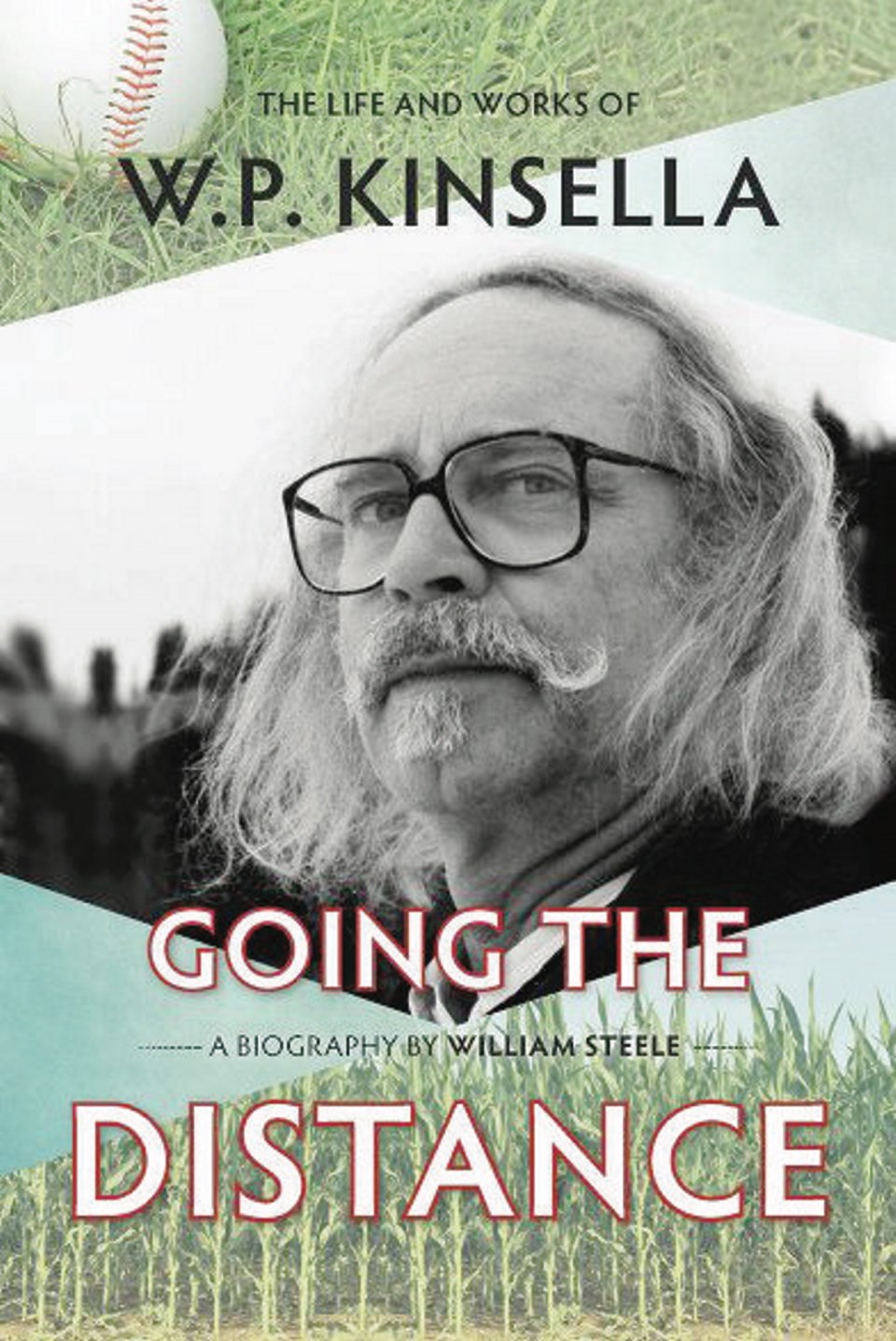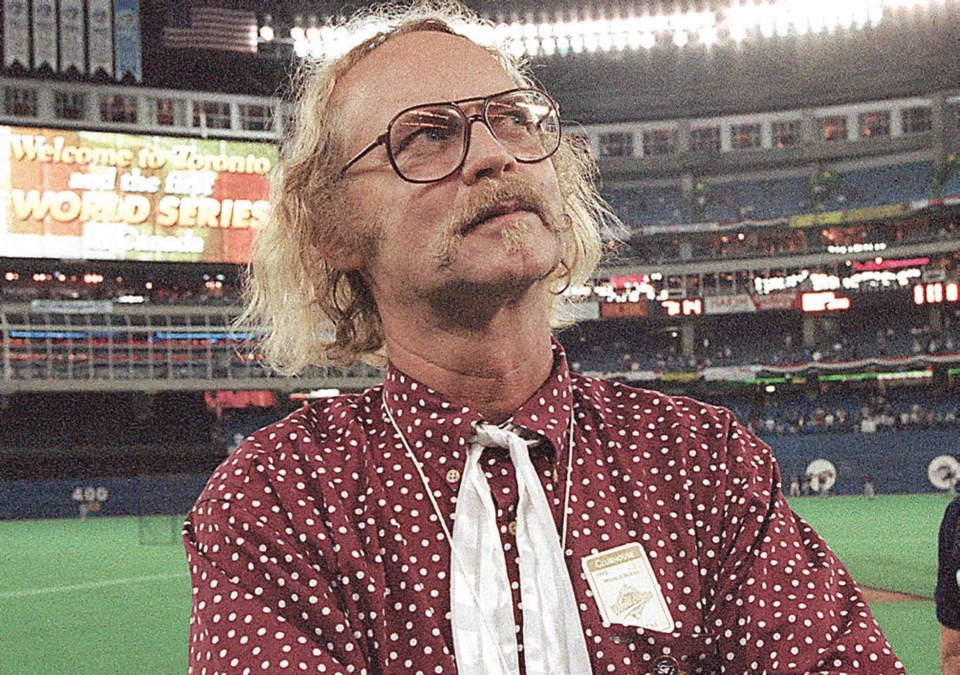Going the Distance: The Life and Works of W.P. Kinsella
By William Steele
Douglas and McIntyre, 293 pages, $34.95
You have to wonder if the killing of Mario Fata on Douglas Street in 1967 changed the course of literary history.
Fata was just 18, and already running Mario’s Pizza Palace, near the corner of Douglas and Caledonia Avenue. He had hired a carpenter to do some work at the restaurant, there was a dispute over the bill and Fata ended up on the sidewalk, with his blood splattered over his white shirt.
Fata’s brother, Elio, tried to keep the business going for a few months, but couldn’t make it work. So the location was taken over by an aspiring writer who had been planning to open an Italian eatery in the University Heights shopping centre in Saanich.
On Dec. 1, 1967, the writer opened Caesar’s Pizza in the former Mario’s location. And the following April, a sample of the writer’s work appeared in an ad the Daily Colonist.
 “An apology to the many customers we had to turn away last weekend, and to those whose telephone orders we had to decline. We were simply deluged with delivery orders and our little restaurant seats only 42 at a time,” he wrote, signing the apology “Bill and Mickey Kinsella.”
“An apology to the many customers we had to turn away last weekend, and to those whose telephone orders we had to decline. We were simply deluged with delivery orders and our little restaurant seats only 42 at a time,” he wrote, signing the apology “Bill and Mickey Kinsella.”
��
Bill was William Patrick Kinsella, the writer who gained fame as W.P. Kinsella; Mickey was Mildred, his wife at the time.
The success of Caesar’s, one of just two pizza restaurants in Victoria in 1967, could have paved the way for a career as a restaurateur, but Kinsella had other plans. He wanted the business to be a stepping stone to financial security, which would allow him to pursue his dream of being a writer.
Kinsella had worked at a variety of jobs in Alberta before moving to Victoria. He applied for jobs at several businesses, including the Colonist, but could not find work here. Undeterred, he decided to create his own job with his own business.
It worked, even though he stopped writing for about three years. With the security offered by the restaurant, Kinsella enrolled in the University of Victoria and there, with the help of instructors such as Robin Skelton and W.D. Valgardson, learned to put his thoughts on paper in a way that captured the imagination of readers everywhere.
In 1972, Kinsella sold his restaurant so he could devote more time to writing. He still had to work odd jobs for a while, including manual labour at sa���ʴ�ý Forest Products and driving for Victoria Taxi, but he achieved his dream.
By the late 1980s, he was at the top of his game, with the movie Field of Dreams, based on his book Shoeless Joe, bringing millions to theatres for its mixture of baseball, fantasy and hope.
In Going the Distance: The Life and Works of W.P. Kinsella, William Steele gives us a comprehensive look at Kinsella’s life, his career and his loves. Steele, a professor of English in Nashville, Tennessee, wrote his master’s thesis and doctoral dissertation on Kinsella’s baseball stories.
Kinsella was not only driven to succeed, but driven to live his life on his own terms.
He knew what he wanted, and walked away from security more than once in order to achieve it. He could have had a chain of restaurants in Victoria, and later he could have been a tenured professor at the University of Calgary, but those careers did not interest him.
Kinsella was, at times, a hard person to like. Even in this book, written by a fan of his work, he comes across as bitter, opinionated, curmudgeonly and stubborn.
His early success was based on his writing about a young Cree named Silas Ermineskin, from the Hobbema community south of Edmonton. Throughout his career, Kinsella was accused of cultural appropriation for adopting the voice of an Indigenous person, and was criticized for using stereotypes as the basis for his stories.
Those concerns did not slow Kinsella’s rise in literary circles, or curb his interest in writing about his subject matter. As he noted, controversy helped him to sell books.
Steele’s biography, based on Kinsella’s diaries as well as unpublished notes and interviews, and reviews of Kinsella’s books, dives deep into Kinsella’s life. We learn about his love life, including his interest in sex, the four women he married, and the others who could have shared his life if things had worked out.
Be warned: At times, the personal touches seem too personal.
Steele’s reliance on book reviews can be distracting at times, as he tosses the names of reviewers around as if we know who they are. Two of the people he quotes are friends of mine, but that does not mean anything to the typical reader.
Kinsella had health issues all of his life, and they got worse in his senior years. He chose to die in September 2016 in an assisted suicide, and made sure that his decision was made public. He was in control of his life, and keen to share his opinions, to the end.
Going the Distance is a fascinating look at the ideals and spirit that shaped and pushed Kinsella to the top, which included giving us one of the most famous sayings of our time, even if it has been misquoted more often than not.
“If you build it, they will come” has become a standard comment in business boardrooms, places Kinsella would have avoided. But in Field of Dreams, the actual line was: “If you build it, he will come.”
Kinsella built a business in Victoria, and the customers came, so he was able to leave it all behind.
For better or worse, he had a huge impact on North American literature, a reminder to all of us to chase our dreams. Or, in Kinsella’s own words, also from Field of Dreams: Go the distance.
